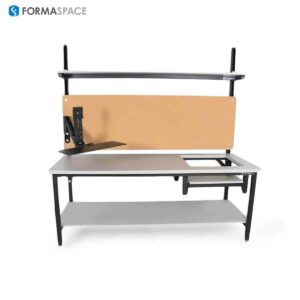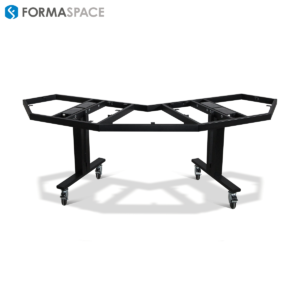Here at Formaspace, we know that our manufacturing and distribution customers take their supply chains very seriously. For those of you that not familiar supply-chain management, one of the major annual conferences is taking place this week in Las Vegas. It’s the APICS 2015 Conference for supply-chain and operations management professionals. APICS, which dates back to its founding in 1957 as the American Production and Inventory Control Society, now boasts more than 40,000 members and over 300 local chapters (called channel partners) across the world.
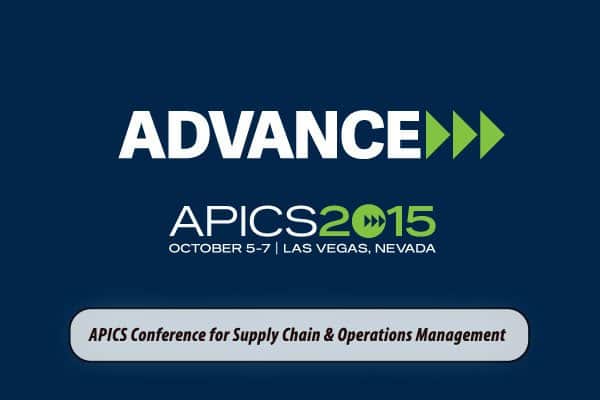
What Has Come Out of the Merger Between Supply-Chain Council & APICS?
If you asked people a generation ago what supply-chain management was about, you might’ve gotten a blank stare. Today, that’s no longer the case. We live with products everyday that have a long supply chain — just look in your pocket. There’s probably a smart phone from Apple or Samsung or another manufacturer in your pocket right now that has hundreds of high-tech components sourced from around the world.
Yesterday at the APICS 2015 conference, the global futurist and trend spotter Jim Carroll gave a presentation on ways that supply chain professionals can respond to periods of uncertainty by re-framing their business advancement opportunities to achieve significant, transformative change. Easier said than done! There are many challenges facing supply-chain and operations management professionals who want to make their businesses more responsive and profitable. APIC’s merger with the Supply-Chain Council in 2014 is a significant step toward helping supply-chain managers wrestle with the big picture. How so? The Supply-Chain Council has developed a sophisticated business process modeling tool, called SCOR, that helps executives and managers across the organization speak in a common language.
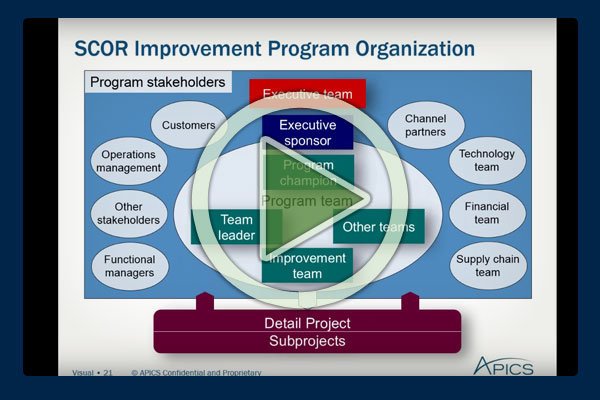
At first the idea may seem overly simplistic. And, at its core, SCOR is very straightforward. You work toward establishing a common process modeling language in your organization, then you identify ways to measure performance, and finally you identify best practices in the industry to make informed comparisons about your own performance. Once you have a common language established (based on proven SCOR terminology) and your industry best practices identified, you can divide and conquer your supply chain problems by focusing on six different areas: Plan, Source, Make, Deliver, Return and Enable.
Former GE Chairman and CEO Jack Welch and his wife, Suzy Welch, Speak at APICS
The stereotype of supply-chain management is that it’s a fairly dry and technical discipline. Yet it offers creative, talented and capable individuals a lot of opportunity to work together in a team to make businesses thrive — and beat the competition. Attracting talent to supply-chain and operations management is critical for success. And so the APICS 2015 was fortunate enough to bring former GE Chairman and CEO Jack Welch and his wife, former editor-in-chief of the Harvard Business Review, Suzy Welch to speak this week to the APICS attendees in Las Vegas. This power couple wrote the international bestseller Winning in 2005, and they are now promoting their new book: The Real-Life MBA: Your No-BS Guide to Winning the Game, Building a Team and Growing Your Career.

APICS is keenly aware of the need to attract and develop supply-chain management talent. The video above is an example of the professional development tools that APICS provides its members. Here, researchers at Michigan State University’s Eli Broad College of Business identify emerging best practices for developing a trained, educated, knowledgeable and experienced tactical workforce as well as identifying and nurturing future leaders to guide global supply chain strategy and execution.

APICS recognizes that when it comes to recruiting talent to take on the leadership roles in supply-chain and operations management, women in STEM programs (science, technology, engineering, mathematics) are ideal candidates to advance in careers in manufacturing, logistics and distribution oriented industries. (As we’ve written before in our article Celebrating Leading Women in Industry, we applaud efforts to promote women in business and technical fields — so we are pleased APICS is taking a similar stance.)
Formaspace is Looking to the Future of Supply-chain Management
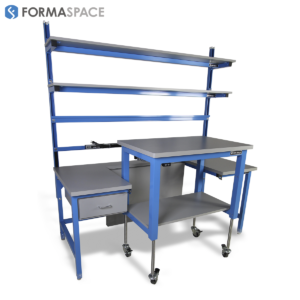
We invite you to join the roster of satisfied Formaspace technical, manufacturing and laboratory furniture clients — including Apple Computer, Boeing, Dell, Eli Lilly, Exxon Mobile, Ford, General Electric, Intel, Lockheed Martin, Medtronic, NASA, Novartis, Stanford University, Toyota and more.
Give us a call today at 800.251.1505 to find out more about the Formaspace line of built-to-order computer workstations, industrial workbenches, laboratory furniture, lab benches and dry lab/wet labs — as well as our design / furniture consulting services. Like all Formaspace furniture, it’s backed by our famous 12 year, three shift guarantee.





